
Cleaning Your Baby’s Mouth – How, When to Start and Precautions
7 min readWritten by Dr. Hafsa Fatima

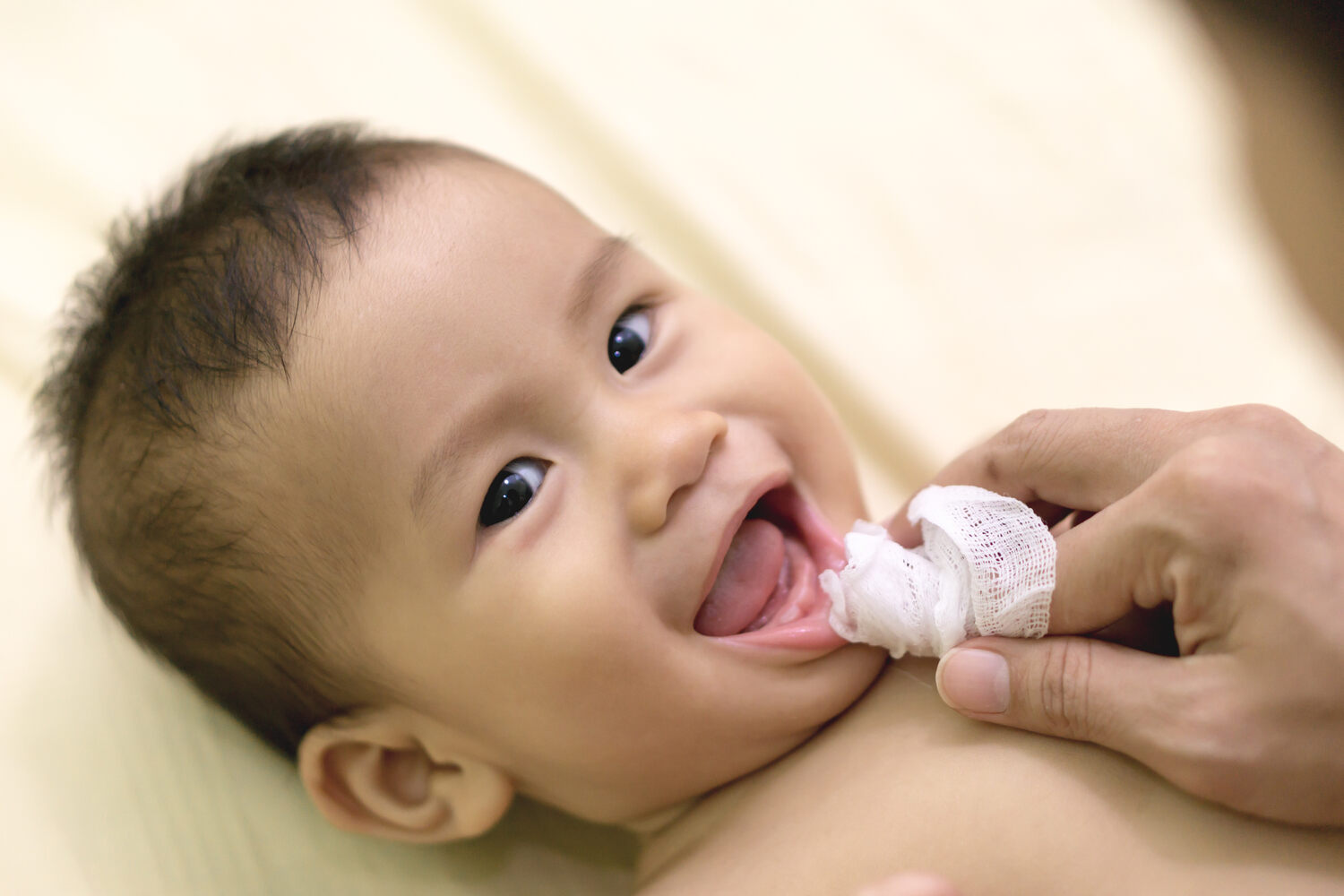
Keeping your child’s mouth healthy means brushing their teeth regularly. They are susceptible to tooth decay and other issues if they are not adequately cared for at home. To keep babies healthy before their first teeth appear, they need to keep their tongues, gums, and inside cheeks free of germs. So, how to clean your baby’s mouth?
Cleaning a baby’s mouth is simple and fairly straightforward. There are different methods of cleaning a baby’s mouth before and after a tooth eruption. You can always consult your pediatrician or a pediatric dentist to understand the right way to care for your little one’s dental health. However, to make things easy for you, we have this informative blog! So read on!
In This Article
- Why Should You Clean Your Baby’s Mouth?
- When to Start Cleaning Your Baby’s Mouth?
- How to Clean Your Newborn’s Mouth And Tongue?
- When And How to Clean Your Baby’s Teeth?
- Precautions to Take When Cleaning Your Newborn’s Mouth
- Baby’s First Dental Checkup
- FAQ’s
Why Should You Clean Your Baby’s Mouth?
At roughly four months old, babies begin to experience teething. Even before that occurs, practicing good dental hygiene every day is essential. Bacteria may grow in your baby’s sweet saliva if you leave breast milk or formula leftovers in their mouth for a longer period. Fungal infections may result from this [1].
After breastfeeding, it is typical for your infant to have a stained tongue. Milk residue clings to their tongues because of this. On the other hand, oral thrush might appear as creamy white sores in your baby’s mouth.
Thrush is a common fungal illness that may spread quickly, so if you suspect your infant has it, see a doctor. Cottage cheese-like lumps that can’t be readily removed. Thrush-infected infants find it difficult to feed because of their pain and burning [2].
Plaque may quickly accumulate and cause tooth decay in newborns and babies who do not practice good oral hygiene, affecting their teeth as they grow older. When your baby or toddler consumes a sugary snack, bacteria in the plaque begin producing acids. These acids eat away at the outer covering of teeth, known as dental enamel, resulting in cavities.
When to Start Cleaning Your Baby’s Mouth?
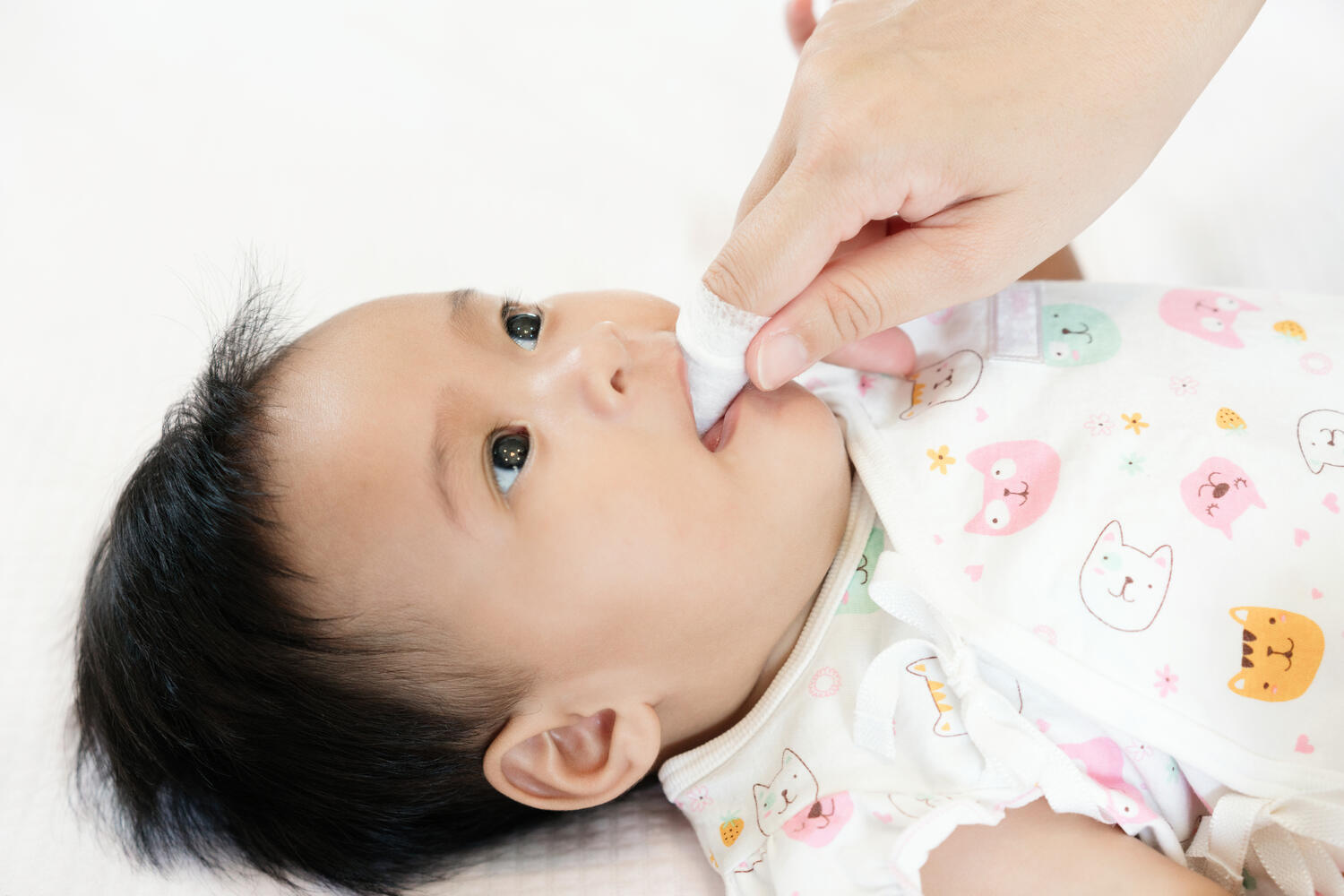
Brushing your baby’s teeth should begin as soon as the first tooth appears. It might take anything from three to nine months for this. First teeth may come as early as six months, but some newborns don’t erupt until they’re a year old.
How To Clean Your Newborn’s Mouth And Tongue?
You don’t need a lot of equipment to clean a baby’s tongue and gums, and the technique is straightforward [3]. All you’ll need is a washcloth or a piece of gauze and warm water.
- To begin, use soap and water to clean your hands thoroughly. Start cleaning your baby’s mouth while holding them in one of your hands.
- Cover one of your fingers with gauze or fabric and dip it into the heated water.
- Open your baby’s mouth gently and gently touch their tongue with the cloth or gauze in a circular motion.
- Gently massage your baby’s gums and inside cheeks with your finger.
- Your baby’s mouth and gums may also be cleaned using a soft finger brush intended to massage the milk residue away gently. Brushing your baby’s tongue at least twice a day is recommended.
- If you see a white coating on your baby’s tongue, it’s vital to know that milk isn’t always to blame. Thrush may be to blame in some instances. Thrush and milk residue have a similar appearance. The difference is that milk residue may be removed with a damp cloth. Thrush cannot be wiped off.
- Oral thrush is an infection of the mouth caused by a fungus. White spots appear on the tongue, gums, cheeks, and roof of the mouth as a result of oral candidiasis.
- To prevent the spread of thrush, an antifungal drug must be used. Contact your baby’s physician if the white covering doesn’t come off.
When And How to Clean Your Baby’s Teeth?
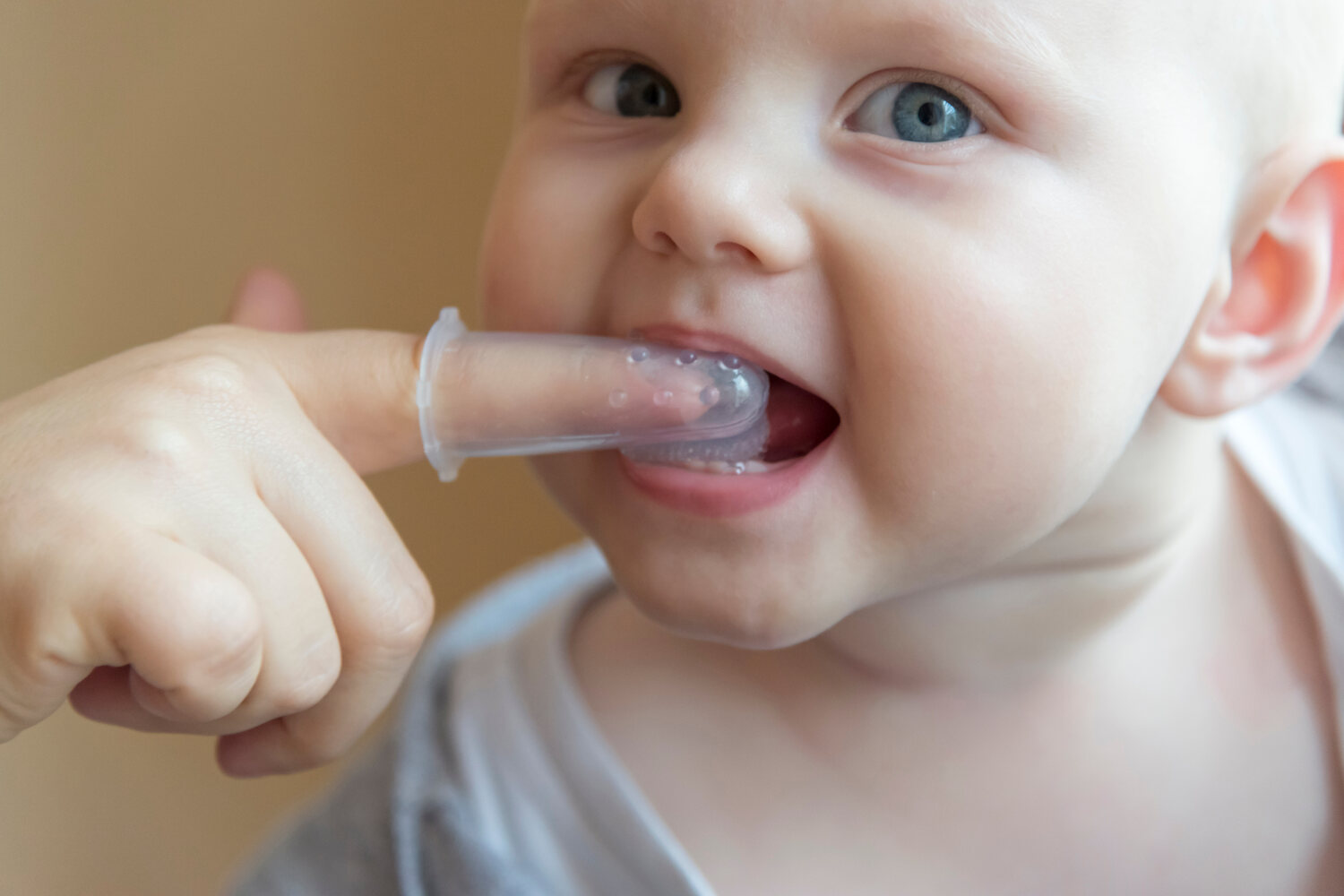
As soon as your baby’s first tooth erupts (around 6 months of age) you must begin brushing their teeth for 2 minutes at least twice every day. This should be done preferably after their first meal of the day, and before going to bed. Brushing their teeth before bedtime helps prevent food or milk from settling in their mouth overnight.
Here is a comprehensive guide on how to clean your baby’s teeth:
- Position your baby in such a way that you can see their teeth and they feel comfortable.
- You may sit on the floor with your baby’s head lying on your lap to visualize the teeth well.
- Initially use a soft-bristled finger brush to make gentle circular strokes on the front, back, and top surfaces of all your teeth [3].
- You may opt to smear a little toothpaste (just the size of a grain of rice) [4].
- It is advisable to brush your baby’s teeth twice daily [3]
- As the baby gets more teeth you can gradually transition to a baby toothbrush with the same size of toothpaste until age 3.
- Furthermore, remember not to use fluoride toothpaste until your baby turns 2 [4]
- Young babies cannot brush their teeth until age 1, thus it is essential to brush their teeth and teach them how to spit.
- Care should be taken that the baby should not swallow the toothpaste.
After cleaning your baby’s teeth, rinse and clean the toothbrush with water. Store it in an upright position in an open case to allow it to air-dry. Remember to replace your baby’s toothbrush every 3 to 4 months or when the bristles wear out.
Precautions to Take When Cleaning Your Baby’s Mouth
You’ll need to do a few things to keep your baby’s teeth and gums healthy. As soon as your child’s first tooth appears, it would help if you began taking them to the dentist regularly. Ensure that you follow the dentist’s advice on properly caring for your baby’s oral health.
Here are a few precautions to take when cleaning your little one’s mouth.
- The best technique to clean a baby’s tongue is with water. The tongue may be cleaned using a piece of soft gauze, or cotton cloth dipped in warm water. However, you must watch out for your baby’s safety and avoid putting them in water that is too hot.
- While brushing their teeth, have them clean their tongue while you do something fun with them
- It’s possible to remove white residue from the baby’s tongue by dabbing it with a little drop of toothpaste; however, you should make sure to thoroughly rinse the toothpaste off the baby’s mouth to avoid swallowing it.
- While brushing their tongue, be sure to clean the gums and the inside of their cheeks thoroughly.
- It is common for some newborns to grow irritable and refuse to let their mouths be cleaned. It would help if you waited till your child was in a better mood before cleaning the tongue.
- Last but not least, schedule frequent dentist appointments for your baby
Baby’s First Dental Checkup
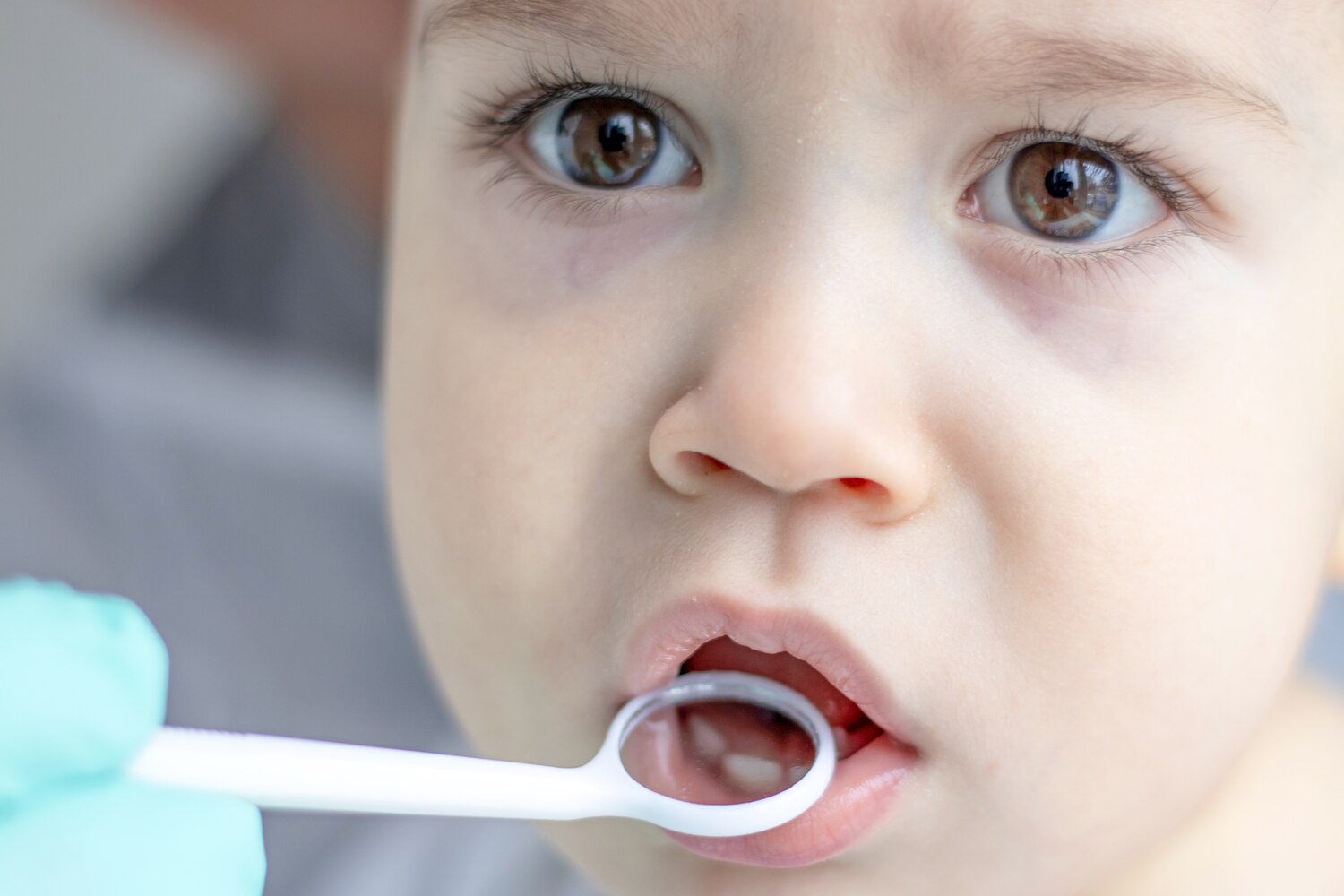
Your baby’s first dental visit is usually recommended around 12 months of age or within 6 months of the first tooth coming in [5]. It often lasts around 30 to 40 minutes. Depending on the baby’s age, the dentist may evaluate your baby’s teeth, gums, jaws, and bite to assess growth and development.
If needed your baby may also get a gentle cleaning to remove plaque, food debris, and stains, and polish their teeth. The dentist may educate you to take care of your baby’s teeth by teaching you the right brushing technique. You may also be advised about the need for fluorides and dental sealants. Usually, your dentist may not recommend dental radiographs for babies unless they have a prominent tooth decay that requires evaluation. Your baby’s first visit should be as comfortable and relaxing as possible since it marks the cornerstone for good oral health in the future. Being familiar with the dentist will help prevent the risk of dental fear and anxiety.
Even if your baby doesn’t have teeth yet, that doesn’t mean you shouldn’t worry about their oral health. The importance of good oral hygiene in neonates cannot be overstated. Because cleaning a baby’s mouth isn’t a simple process, many new parents wonder how they can do it. Cleaning a baby’s mouth may be challenging since they may cry or retaliate, making the task more difficult for you! However, you must wipe their gums, and brush their teeth to maintain a clean and healthy mouth for them.
FAQ’s
1. Why Does Your Baby Have a White Tongue?
Newborns often have a white tongue. In many cases, milk residue is to blame, but it may also be a sign of an infection, such as oral thrush. The tongues of newborns are often coated with milk.
2. When Should You Start Brushing Your Baby’s Teeth?
As soon as your baby’s teeth begin to erupt, you may begin brushing them. Brush your baby’s teeth using a baby toothbrush and a pea-sized amount of fluoride toothpaste. Initially, brushing your teeth may not be as effective as you’d hoped. Brushing your baby’s teeth is the most crucial thing you can do to ensure that he or she grows up with a healthy habit.
3. Can You Use Toothpaste to Brush Your Baby’s Teeth?
As soon as your baby’s teeth begin to erupt, you may begin brushing them. Brush your baby’s teeth using a baby toothbrush and a pea-sized amount of fluoride toothpaste. Initially, brushing your teeth may not be as effective as you’d hoped. Brushing your baby’s teeth is the most crucial thing you can do to ensure that he or she grows up with a healthy habit.
4. How To Get Rid of My Baby’s White Tongue?
You can consult your baby’s pediatric doctor to get help for the white tongue. The doctor may prescribe a liquid antifungal solution that needs to be applied to the baby’s tongue. You must leave the medicine for 30 minutes for it to work, thus avoiding feeds for the mentioned duration.
References
- Effect of oral hygiene in infants before dental eruption on Candida spp. colonization and the occurrence of oral candidiasis: A randomized clinical trial – [https://www.ncbi.nlm.nih.gov/pmc/articles/PMC10699766/]
- Neonatal thrush of newborns: Oral candidiasis? – [https://www.ncbi.nlm.nih.gov/pmc/articles/PMC6820580/]
- Tooth brushing, tongue cleaning, and snacking behavior of dental technology and therapist students – [https://www.ncbi.nlm.nih.gov/pmc/articles/PMC3066761/]
- Use of Toothpaste and Toothbrushing Patterns Among Children and Adolescents — United States, 2013–2016 – [https://www.ncbi.nlm.nih.gov/pmc/articles/PMC6400578/]
- First Dental Visit: Age Reasons Oral Health Status and Dental Treatment Needs among Children Aged 1 Month to 14 Years – [www.ncbi.nlm.nih.gov/pmc/articles/PMC99]

Dr. Hafsa Fatima,Bachelor of Dental Surgery
Responses (0)
Want curated content sharply tailored for your exact stage of parenting?
Related articles

Kissing a Baby – Is it Safe?
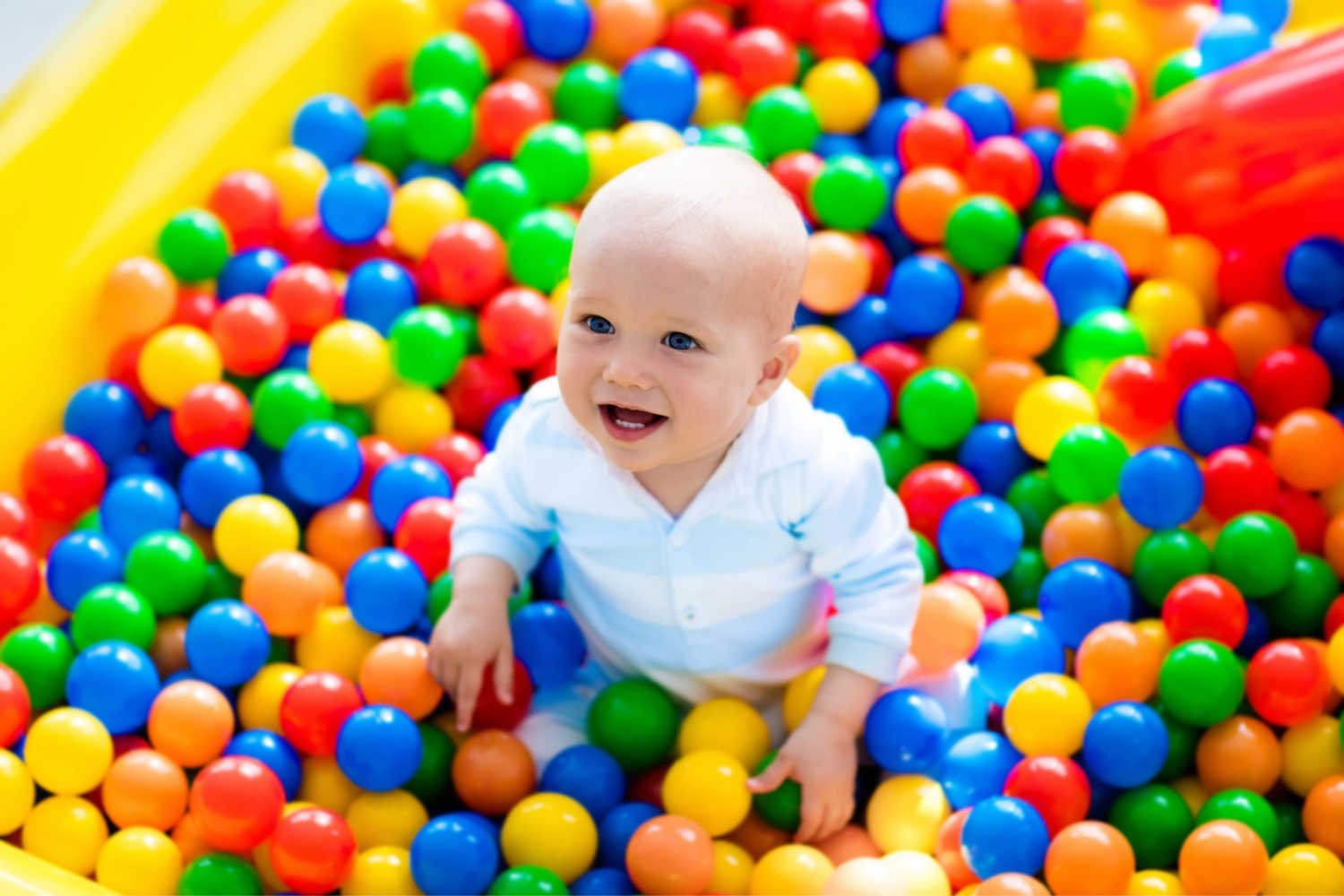
Ball Pit Balls For Babies – How it Helps in Baby’s Development

Hummus For Babies – When to Introduce, Benefits and Precautions
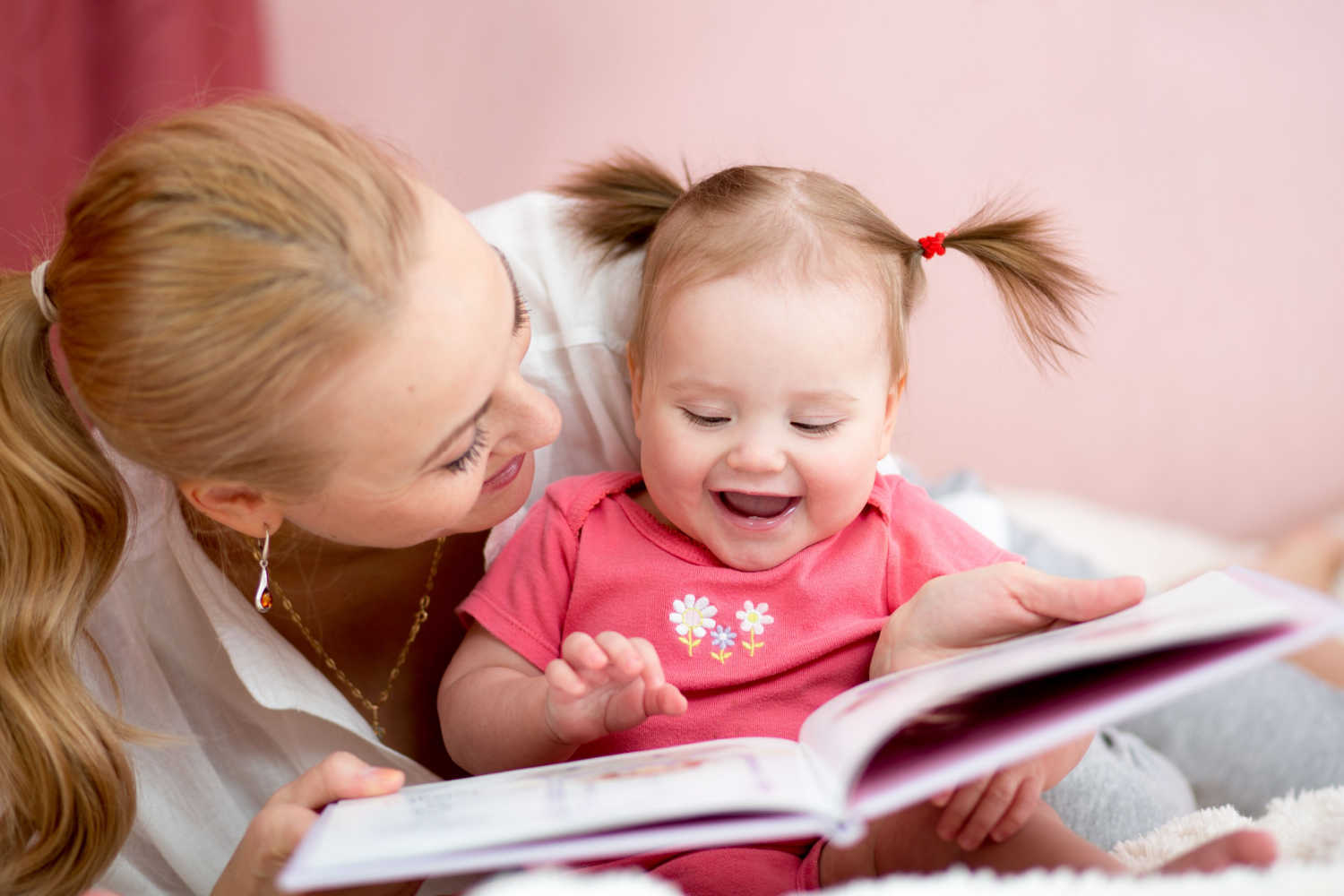
Top 8 Classic Children’s Books You Should Read to Your Baby in First Year

Pregnancy Passions: Rediscovering Intimacy on the Parenthood Journey

How to deal with unexpected challenges when traveling with a newborn
Sponsored content
Discover great local businesses around you for your kids.
Get regular updates, great recommendations and other right stuff at the right time.





